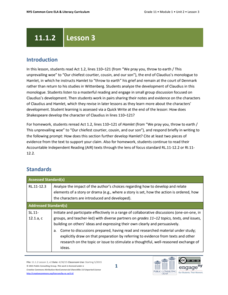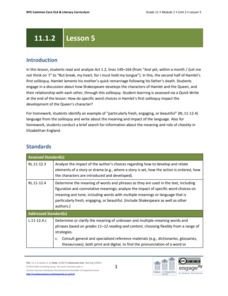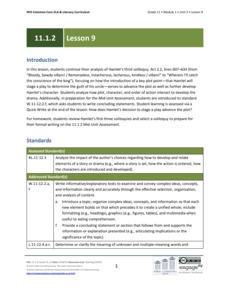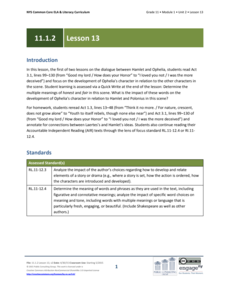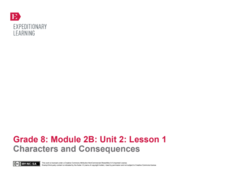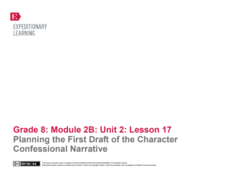EngageNY
Grade 11 ELA Module 1: Unit 2, Lesson 3
How does Shakespeare develop the character of Claudius in the first Act of Hamlet? Using a helpful resource, pupils complete a Quick Write to answer the question. Readers also work in small groups to discuss the characters of Claudius...
EngageNY
Grade 11 ELA Module 1: Unit 2, Lesson 5
Scholars delve into Act 1.2 of Shakespeare's Hamlet. By completing a writing exercise and participating in a class discussion, they continue to analyze how the author develops the characters in the play.
EngageNY
Grade 11 ELA Module 1: Unit 2, Lesson 6
How does Shakespeare develop the characters of Laertes and Ophelia in Hamlet? Scholars complete a Quick Write to answer the question. They also continue reading and discussing the first act of the play.
EngageNY
Grade 11 ELA Module 1: Unit 2, Lesson 8
How does Shakespeare employ figurative language to emphasize central ideas in Hamlet? Using an interesting resource, learners complete a Quick Write to answer the question. Additionally, they continue their study of the play by exploring...
EngageNY
Grade 11 ELA Module 1: Unit 2, Lesson 7
Following a ghost's advice may not be in anyone's best interest, but that doesn't stop Hamlet! Using an exciting resource, pupils continue reading Act 1 of Shakespeare's Hamlet, in which the ghost tries to convince Hamlet to seek revenge...
EngageNY
Grade 11 ELA Module 1: Unit 2, Lesson 12
How does Shakespeare develop the main ideas in Hamlet? Using the resource, scholars continue analyzing the famous monologue from the play. They identify a central idea from the passage and write to explain how it relates to other central...
EngageNY
Grade 11 ELA Module 1: Unit 2, Lesson 10
To write an essay or not to write an essay—that is the question! Scholars complete a mid-unit assessment based on their study of Hamlet. They write essays analyzing how Shakespeare develops Hamlet's character about other characters.
EngageNY
Grade 11 ELA Module 1: Unit 2, Lesson 9
Hamlet has an unusual take on the criminal justice system when he decides to determine his uncle's guilt by staging a play. With the resource, scholars continue analyzing Hamlet's third soliloquy from Act 2.2 of Shakespeare's Hamlet....
EngageNY
Grade 11 ELA Module 1: Unit 2, Lesson 11
What is Hamlet's attitude towards life and death in Shakespeare's Hamlet? Scholars continue reading the play to answer the question, paying particular attention to Hamlet's most famous soliloquy. By holding a discussion and completing...
EngageNY
Grade 11 ELA Module 1: Unit 2, Lesson 13
What impact does word choice have on character development? Using the resource, scholars read Act 3.1 from Shakespeare's Hamlet, focusing on the development of Ophelia's character. They also complete a Quick Write to analyze the meaning...
EngageNY
Grade 11 ELA Module 1: Unit 3, Lesson 4
How have society's expectations influenced female writers? Pupils explore the topic by reading chapter three of Virginia Woolf's A Room of One's Own. Scholars complete a Quick Write to analyze how Judith Shakespeare's experiences...
EngageNY
Analyzing Character and Theme: Tracking Control in A Midsummer Night’s Dream
Pupils first participate in a drama circle as they continue reading Shakespeare's A Midsummer Night's Dream aloud with classmates. Next, scholars move around and discuss text-dependent questions about the play with a Three Threes in a...
EngageNY
Launching A Midsummer Night’s Dream: Identifying the Characters, Settings, and Conflicts
Scholars form a drama circle and begin reading Shakespeare's A Midsummer Night's Dream. They also use a play map to identify the setting, characters, and conflicts from the text.
EngageNY
Characters and Consequences
Scholars consider how dialogue reveals aspects of a play's characters as they read Shakespeare's A Midsummer Night's Dream and complete a written conversation note-catcher. Additionally, pupils participate in an I Have/Who Has jigsaw...
EngageNY
Analyzing Character and Theme: Tracking Control in A Midsummer Night’s Dream
Scholars examine how characters try to control one another in Shakespeare's A Midsummer Night's Dream. They engage in a read-aloud and class discussion to iron out ideas. They also work in small groups to complete a note-catcher...
EngageNY
Analyzing the Resolution of the Play: World Café Discussion
It's time to get active! Scholars participate in a World Café protocol to promote discussion and leadership. They leave their seats and move from group to group to discuss critical questions related to their read-aloud of Shakespeare's A...
EngageNY
Leaving the Play: All’s Well That Ends Well
How does Shakespeare develop the theme of control in A Midsummer Night's Dream? Using the resource, scholars analyze the theme of parental control in the play and the Greek myth "Pyramus and Thisbe." Next, they talk to partners to...
EngageNY
Analyzing the Model Essay: Studying Argument
Scholars begin writing an argument essay based on Shakespeare's A Midsummer Night's Dream. They read and analyze a model essay, considering the author's thinking before writing it.
EngageNY
Writing an Argument Essay: Evaluating the Model and Crafting a Claim
Pupils prepare to write argumentative essays based on Shakespeare's A Midsummer Night's Dream. They begin weighing evidence and crafting claims for their writing about control.
EngageNY
Writing an Argument Essay: Planning the Essay
Pupils use a helpful resource to begin a Writing Improvement Tracker, developing awareness of their writing strengths and challenges. Additionally, they continue planning their argument essays about Shakespeare's A Midsummer Night's...
EngageNY
End of Unit 2 Assessment, Part 1:Drafting the Argument Essay
An informative resource instructs pupils on how to write their essay drafts about the theme of control in Shakespeare's A Midsummer Night's Dream. Next, scholars complete an Exit Ticket, listing their three favorite characters from the...
EngageNY
Planning the First Draft of the Character Confessional Narrative
Scholars read and analyze a model character confessional narrative to help guide their writing. Then, they plan the first draft of a character confessional based on Shakespeare's A Midsummer Night's Dream.
EngageNY
Launching the Performance Task: Prompt, Characters, Groups
Scholars unpack the word confession as they prepare to write confessionals based on characters from Shakespeare's A Midsummer Night's Dream. Next, they read their narratives to a small group of peers as part of a final performance task.
EngageNY
End of Unit 2 Assessment, Part 2: Revise Essay Drafts
Time to revise! Scholars revise their argument essays based on Shakespeare's A Midsummer Night's Dream using feedback from their teacher and peers. They begin their revisions after reviewing a mini-lesson on proper writing conventions.
Other popular searches
- William Shakespeare
- Shakespeare Sonnets
- Shakespeare in Love
- Rhyming Couplets Shakespeare
- Shakespeare in Love Film
- Shakespeare and Macbeth
- Esl and Shakespeare
- Shakespeare Phrases
- Shakespeare Activity
- Shakespeare Acting
- Shakespeare Julius Caesar
- Shakespeare Lesson Plans


